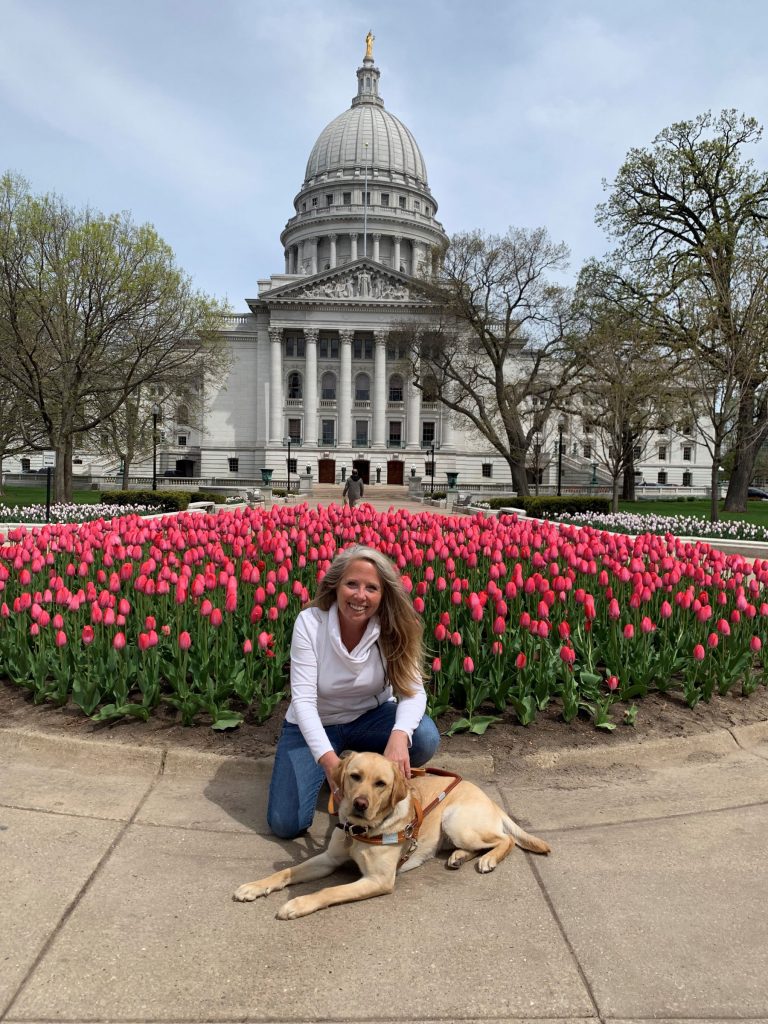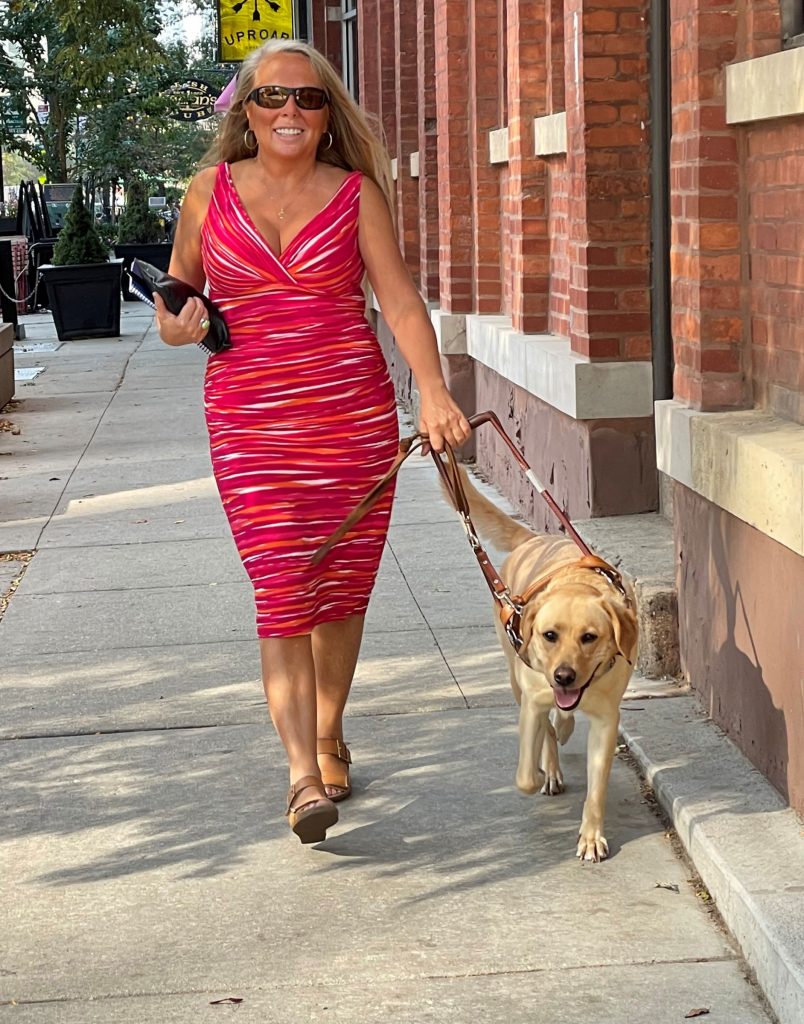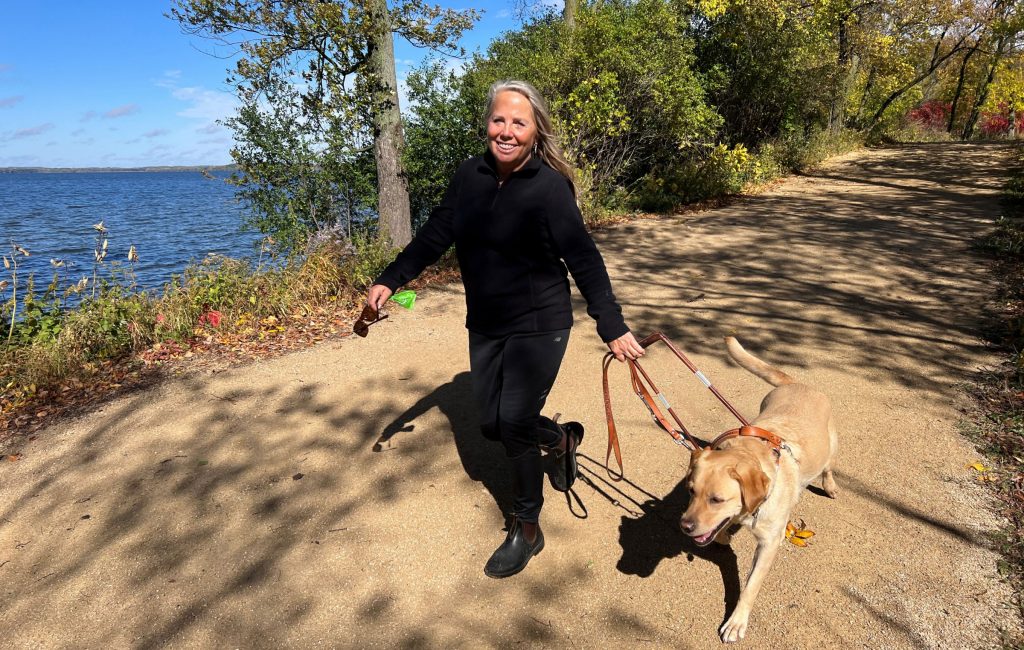Wendi Dwyer has proven time and time again that her resolve is bigger than any challenge in front of her. So, when she started losing her eyesight, she vowed to find a way to keep doing the things she loved – and in the process became an inspiration to others.
“My life’s goal is to remove the stigma of blindness,” Wendi said. “I want to help remove those barriers from society so that blind and visually impaired individuals can live their best lives. I realized that my having this experience could improve the experience for others if I were open and truthful about what I needed and did not pretend I wasn’t struggling. I was determined to make the best of a tough situation.”
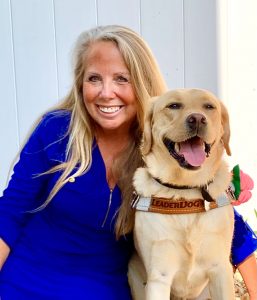
It all began about 15 years ago when Wendi first noticed that she wasn’t recognizing faces.
“I would look for things with my feet instead of my hands,” Wendi explained, “because I knew wasn’t going to find anything with my eyes. When my brother asked me why I was doing that, I realized it wasn’t normal.”
At a friend’s suggestion, Wendi, who was living in Chicago, Illinois at the time, went to an ophthalmologist. A series of tests confirmed that she had Retinitis Pigmentosa (RP), a rare eye disease that causes gradual vision loss. The condition changes how the retina – the light-sensitive layer of tissue at the back of the eye – responds to light. Vision loss occurs as the light-sensing cells gradually die off. RP is a genetic condition, meaning it can be passed down in families.
The diagnosis came as a shock.
“My vision had changed so gradually that I didn’t realize I was visually impaired,” Wendi recalled. “I thought it would be a matter of getting different glasses and stronger sunglasses. I had no idea I was going blind.”
“Naturally, it was stressful,” Wendi continued. “It was hard to fathom losing my sight and not being able to do certain things, like drive a car ever again. I wondered how I would travel while blind, or cook, or host parties. How would I keep names straight when I couldn’t see faces?”
Wendi wasn’t new to embracing a challenge. In fact, she’s spent a lifetime working for various philanthropic organizations. In 2011, she founded Literacy at the Well, a nonprofit organization that provides reading instruction to South Sudanese women at the wells where they gather to retrieve safe water for their families. Later, Wendi would lead fundraising efforts for PBS Wisconsin, Leader Dogs for the Blind, and Foundation Fighting Blindness.
If she tapped into the same inner strength she used for others, she knew she could persevere.
“I decided to live in the reality of the experience and not pretend it wasn’t happening,” Wendi said. “I realized the best thing I could do was focus on gaining skills that would enable me to do the things I loved. If I did that, I’d have the skills I needed to be successful in all areas of my life. If I really want to do something, I’m going to figure out how to do it.”
Although she could no longer drive, Wendi biked everywhere. Once that was no longer safe for her, she got used to walking and using public transportation. Then, when the time came in 2017, she learned to use a sight cane. And today she has a guide dog. These are things, according to Wendi, that only a small percentage of legally blind people actually use.
“There is a stigma attached to being blind,” Wendi said. “And using a cane or sight dog is scary for many people because it ‘outs them.’ But no one should be embarrassed to be blind. It’s a natural experience. And no one should make it harder by judging us. Until this is changed, too many will be isolated instead of independent.”
When Wendi moved to Madison, Wisconsin in January 2019, she came under the care of Kimberly Stepien, MD, a medical retina specialist and inherited retinal disease expert with UW Health and professor of ophthalmology with the University of Wisconsin Department of Ophthalmology and Visual Sciences. Dr. Stepien, along with her pediatric counterpart, Melanie Schmitt, MD, direct the Inherited Retinal Disease (IRD) Clinics at the University of Wisconsin—Madison, the only one of its kind in the state. Dr. Stepien was able to help Wendi confirm the underlying genetic cause of her retinitis pigmentosa.
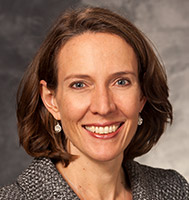
The IRD clinics are a patient-focused clinic specifically dedicated to bringing inclusive expert care to individuals with IRDs that can result in early onset vision loss or blindness. Together Dr. Stepien, director of the adult IRD clinic and co-vice chair of clinical affairs, and Dr. Melanie Schmitt, director of the pediatric IRD clinic, have taken their patients’ care experiences to the next level by building a focused, yet nimble team of subspecialists, genetic counselors, study coordinators, photographers, technicians, social workers and schedulers who work together to provide patients like Wendi with highly-individualized care for their IRDs.
“Losing vision due to an IRD has a great impact on the lives of the patient and their families as we have heard from Wendi, and we aim to give them the best care, knowledge and support they need,” said Dr. Stepien. “Our department is also leading the research in the field of IRDs. “We are a site for several clinical trials to both understand and treat IRDs, and our scientists within our department are working towards treatments such as gene therapies and stem cell therapies that we hope one day will prevent or even reverse vision loss.”
Wendi’s passion and insights as an advocate for those with vision loss were immediately recognized, and, a few months later, she was asked to advise the department’s Patient-Centered Care Committee (PCC). The PCC’s is charged to optimize patient care through improving services in areas such as low vision, mental health, transportation, health insurance, education, and advocacy.
Wendi agreed to help but initially was frustrated by what she described as a general lack of understanding of what it was like to be visually impaired as a patient.
“Going blind is a very stressful experience for a person,” Wendi said. “You’re not in the doctor’s office to get good news. It’s important that everyone understands that and doesn’t inadvertently put more barriers in the way.”
Wendi decided the best way to help was to write down everything that could make her experience better. The result was a list of more than two dozen items that included everything from improving lighting and increasing seating in the waiting rooms to training the front desk staff to use guiding language to direct patients to elevators and waiting rooms.
It didn’t take long before Wendi’s frustration transformed into appreciation as she witnessed UW Health make a series of positive changes based on her feedback.
“They took me seriously, and I feel heard,” Wendi said.
Perhaps the biggest improvement, according to Wendi, was the addition of a social worker to UW Health’s Vision Rehabilitation Services. Under the leadership of Sanbrita Mondal, OD, Vision Rehabilitation Services provides patients with services in low vision optometry, occupational therapy, and social work – all in a coordinated setting.
“It’s very important to be aware of an individual’s mental health needs when they are losing their sight,” Wendi said, “and having a social worker on staff helps immensely. People often think they don’t need a social worker, but they do. Social workers have access to information and resources that others may not have. I recommend they utilize those services and not be afraid to ask for help.”
Wendi is no longer a member of the PCC, but she hasn’t stopped being an advocate. She is currently creating a social group for individuals with inherited retinal diseases. Her goal is to help individuals with IRDs find allies in their experience -and to encourage them to get out and live their lives by attending film screenings, bowling outings, and other social activities.
“Going blind is not an easy experience, but it shouldn’t rob anyone of the richness of their life,” Wendi said. “You can still live a full life if you learn how to do things in a different way. Take care of yourself, reduce stress, and foster peace wherever you can. It’s all doable, and I am grateful for the care I receive at the University of Wisconsin IRD Clinic.”
